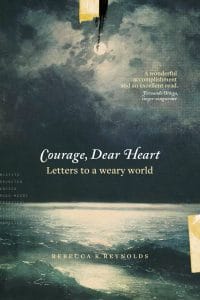
NavPress author Rebecca K. Reynolds’ Courage, Dear Heart is elegant, vulnerable, and relieving. Written as a series of letters to those who face rejection, suffering, chaos, fear, skepticism, disillusionment, life’s rush, and homesickness, this book is full of gorgeous description and the most endearing honesty, consistently intertwined with equal grace and truth. Reynolds validates and comforts the innate longing many of us feel for a world as God intended it to be. She gives no easy answers, soothes without coddling, challenges without cutting, and paints life (and its Creator) in their candid complexity.
This book was like a milk-and-honey tasting on a raging battlefield. I’ve rarely felt so well-loved by an author—a writer who bandages her reader’s wounds with each compassionately chosen word.
In her first pages, Reynolds describes a church art project illustrating Christ’s ability to transform the secret shame of a congregation—anonymous words written and combined in a sea of pained reality. Her description sets the tone and releases the heart.
After a decade of ministry, I had expected to read hard words, so I wasn’t shocked by the types of struggles people admitted. The volume of the suffering of the church, though, knocked me flat. I didn’t unfold one paper that said discouraged—I unfolded two hundred. This single word was written in feminine script, in shaky old handwriting, in masculine block letters, and in teenage bubble letters . . . . How the Lord must ache as he looks down upon the bare sorrows of his people! With that awareness, the sacrificial system of the Old Testament finally made a little more sense to me. Nothing but fire, smoke, and blood could express the smoldering depths of human pain. The New Testament also rang clearer, since nothing but the infusion of divine life could ever redeem such widespread death. As beautiful as humanity is at times, we are also deeply messed up, too helpless for anything less than the rescue of a God. Never again would I look into a body of Christians with the delusion that most of us were mostly okay.
Reynolds delves deep into the hardest parts of being human—never running from doubt but embracing its formative process.
Whether you are disheartened by hypocrisy, melancholy with introspection, or simply terrified by the shattered world we live in, this book meets you at knee-level, and directs your search for meaning and peace back to the Savior who walked all our streets.
In pointing us to Jesus, Reynolds never condescends. She guides and loves us into truth, and that love moves our souls to take our own next hard step.
Until I began writing this book for you, I didn’t realize how C. S. Lewis, Chesterton, and Tolkien must have prayed for their readers—how they must have sat hunched over unfinished paragraphs, asking the Lord to give them precise words and images that would reach through space and time to fill real human hearts with courage and strength. One of the best parts of writing this book has been understanding how dearly those men must have loved me because I know how much I’ve loved you. So if you feel unseen right now, unwanted, rejected, lost—know that your pain has pulled me through long nights and early mornings of wrestling with these chapters. You are the reason I spent two of the hardest years of my life trying to find honest words for weary people. Even while you’ve been hurting, I’ve been praying for you, and I’m praying for you still.
I felt those prayers. And God’s answer to them transforms this book into far more than summer reading. His answer brings courage. His answer brings life itself.